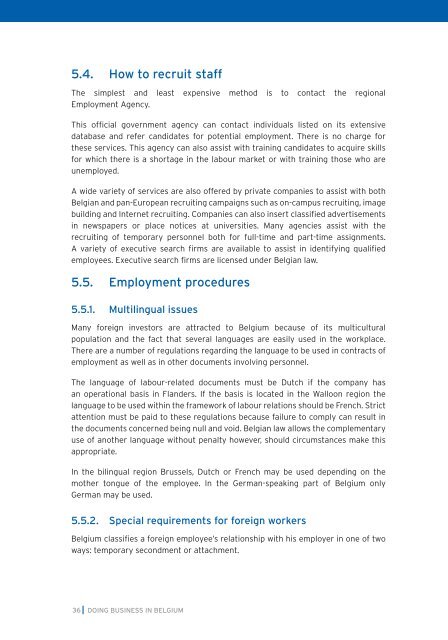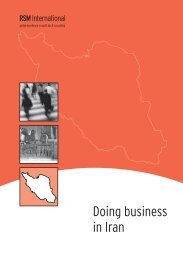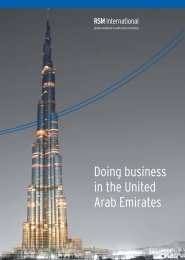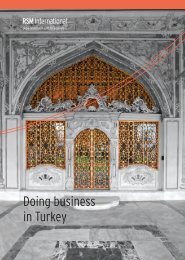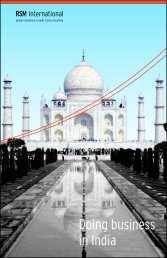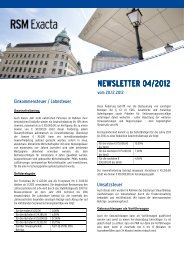Doing Business in Belgium - RSM International
Doing Business in Belgium - RSM International
Doing Business in Belgium - RSM International
Create successful ePaper yourself
Turn your PDF publications into a flip-book with our unique Google optimized e-Paper software.
5.4. How to recruit staff<br />
The simplest and least expensive method is to contact the regional<br />
Employment Agency.<br />
This official government agency can contact <strong>in</strong>dividuals listed on its extensive<br />
database and refer candidates for potential employment. There is no charge for<br />
these services. This agency can also assist with tra<strong>in</strong><strong>in</strong>g candidates to acquire skills<br />
for which there is a shortage <strong>in</strong> the labour market or with tra<strong>in</strong><strong>in</strong>g those who are<br />
unemployed.<br />
A wide variety of services are also offered by private companies to assist with both<br />
Belgian and pan-European recruit<strong>in</strong>g campaigns such as on-campus recruit<strong>in</strong>g, image<br />
build<strong>in</strong>g and Internet recruit<strong>in</strong>g. Companies can also <strong>in</strong>sert classified advertisements<br />
<strong>in</strong> newspapers or place notices at universities. Many agencies assist with the<br />
recruit<strong>in</strong>g of temporary personnel both for full-time and part-time assignments.<br />
A variety of executive search firms are available to assist <strong>in</strong> identify<strong>in</strong>g qualified<br />
employees. Executive search firms are licensed under Belgian law.<br />
5.5. Employment procedures<br />
5.5.1. Multil<strong>in</strong>gual issues<br />
Many foreign <strong>in</strong>vestors are attracted to <strong>Belgium</strong> because of its multicultural<br />
population and the fact that several languages are easily used <strong>in</strong> the workplace.<br />
There are a number of regulations regard<strong>in</strong>g the language to be used <strong>in</strong> contracts of<br />
employment as well as <strong>in</strong> other documents <strong>in</strong>volv<strong>in</strong>g personnel.<br />
The language of labour-related documents must be Dutch if the company has<br />
an operational basis <strong>in</strong> Flanders. If the basis is located <strong>in</strong> the Walloon region the<br />
language to be used with<strong>in</strong> the framework of labour relations should be French. Strict<br />
attention must be paid to these regulations because failure to comply can result <strong>in</strong><br />
the documents concerned be<strong>in</strong>g null and void. Belgian law allows the complementary<br />
use of another language without penalty however, should circumstances make this<br />
appropriate.<br />
In the bil<strong>in</strong>gual region Brussels, Dutch or French may be used depend<strong>in</strong>g on the<br />
mother tongue of the employee. In the German-speak<strong>in</strong>g part of <strong>Belgium</strong> only<br />
German may be used.<br />
5.5.2. Special requirements for foreign workers<br />
<strong>Belgium</strong> classifies a foreign employee’s relationship with his employer <strong>in</strong> one of two<br />
ways: temporary secondment or attachment.<br />
In the case of temporary secondment, the employment relationship is ma<strong>in</strong>ta<strong>in</strong>ed with<br />
the foreign company which assigns the employee on a temporary basis to <strong>Belgium</strong><br />
with regard to organiz<strong>in</strong>g, reorganiz<strong>in</strong>g or controll<strong>in</strong>g its activities. The employee is<br />
subord<strong>in</strong>ate to the foreign employer - he or she cont<strong>in</strong>ues to receive <strong>in</strong>structions<br />
from, and is required to report to the foreign management. He cannot become an<br />
employee of the Belgian company. The seconded employee rema<strong>in</strong>s on the payroll<br />
of the foreign company which cont<strong>in</strong>ues to pay his salary. In addition, the seconded<br />
employee cont<strong>in</strong>ues to be covered by the foreign company’s social security scheme.<br />
In the case of attachment, the foreign employee becomes the employee of the<br />
Belgian bus<strong>in</strong>ess and is listed on its payroll. The employee receives <strong>in</strong>structions from<br />
the local Belgian bus<strong>in</strong>ess and performs his or her duties under the authority of the<br />
Belgian management.<br />
The employee is also subject to the Belgian social security system.<br />
Employees will be eligible for favorable tax status provided <strong>in</strong> <strong>Belgium</strong> for foreign<br />
executives provided they satisfy either of the follow<strong>in</strong>g two conditions:<br />
• They are detached either by a foreign corporation to work temporarily with its<br />
establishment <strong>in</strong> <strong>Belgium</strong> or with another company it controls, or by a foreign<br />
corporation member of an <strong>in</strong>ternational group to work on a temporary basis with<br />
another company of the same group or with a control or coord<strong>in</strong>ation office of<br />
the group, or;<br />
• Are hired by a Belgian subsidiary of a foreign corporation or member of an<br />
<strong>in</strong>ternational group to work <strong>in</strong> <strong>Belgium</strong>.<br />
Every employer who employs <strong>in</strong> <strong>Belgium</strong> an employee, subject to Belgian social<br />
security, has to register this employee with the Belgian social security authorities by<br />
mak<strong>in</strong>g a ‘Dimona’ – registration before his assignment.<br />
For employees not subjected to Belgian social security, a LIMOSA declaration has to<br />
be filed before the commencement of work <strong>in</strong> <strong>Belgium</strong>. This declaration can be made<br />
via the <strong>in</strong>ternet at www.limosa.be.<br />
Foreign workers must also have a work permit to be legally employed <strong>in</strong> <strong>Belgium</strong><br />
(European Economic Area citizens excepted). The employee will receive a type B<br />
work permit which is valid for a maximum of one year (and for employment with one<br />
employer) and is renewable. The employer is responsible for obta<strong>in</strong><strong>in</strong>g and renew<strong>in</strong>g<br />
the permit.<br />
When an employer has personnel that were hired abroad or work abroad, then, while<br />
they are work<strong>in</strong>g <strong>in</strong> <strong>Belgium</strong>, it has to draw up certa<strong>in</strong> ‘social documents’ and observe<br />
a number of obligations imposed by Belgian employment law (sometimes referred to<br />
as ‘social law’). These provisions apply regardless of the location of the employer or<br />
the nationality of the posted employee. Nor is it relevant what social security system<br />
or <strong>in</strong>come tax treatment applies.<br />
36<br />
DOING BUSINESS IN BELGIUM<br />
DOING BUSINESS IN BELGIUM<br />
37


